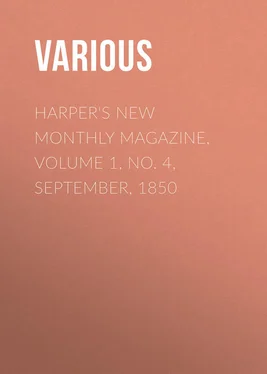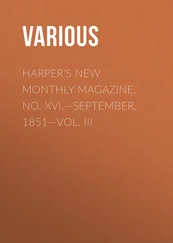Various - Harper's New Monthly Magazine, Volume 1, No. 4, September, 1850
Здесь есть возможность читать онлайн «Various - Harper's New Monthly Magazine, Volume 1, No. 4, September, 1850» — ознакомительный отрывок электронной книги совершенно бесплатно, а после прочтения отрывка купить полную версию. В некоторых случаях можно слушать аудио, скачать через торрент в формате fb2 и присутствует краткое содержание. Издательство: Иностранный паблик, Жанр: periodic, foreign_edu, на английском языке. Описание произведения, (предисловие) а так же отзывы посетителей доступны на портале библиотеки ЛибКат.
- Название:Harper's New Monthly Magazine, Volume 1, No. 4, September, 1850
- Автор:
- Издательство:Иностранный паблик
- Жанр:
- Год:неизвестен
- ISBN:нет данных
- Рейтинг книги:5 / 5. Голосов: 1
-
Избранное:Добавить в избранное
- Отзывы:
-
Ваша оценка:
- 100
- 1
- 2
- 3
- 4
- 5
Harper's New Monthly Magazine, Volume 1, No. 4, September, 1850: краткое содержание, описание и аннотация
Предлагаем к чтению аннотацию, описание, краткое содержание или предисловие (зависит от того, что написал сам автор книги «Harper's New Monthly Magazine, Volume 1, No. 4, September, 1850»). Если вы не нашли необходимую информацию о книге — напишите в комментариях, мы постараемся отыскать её.
Harper's New Monthly Magazine, Volume 1, No. 4, September, 1850 — читать онлайн ознакомительный отрывок
Ниже представлен текст книги, разбитый по страницам. Система сохранения места последней прочитанной страницы, позволяет с удобством читать онлайн бесплатно книгу «Harper's New Monthly Magazine, Volume 1, No. 4, September, 1850», без необходимости каждый раз заново искать на чём Вы остановились. Поставьте закладку, и сможете в любой момент перейти на страницу, на которой закончили чтение.
Интервал:
Закладка:
We have glanced briefly at Sir Robert Ker Porter’s wonderful talents, and Anna Maria, when in her twelfth year, rushed, as Jane acknowledged, “prematurely into print.” Of Anna Maria we knew personally but very little; enough, however, to recall with a pleasant memory her readiness in conversation, and her bland and cheerful manners. No two sisters could have been more different in bearing and appearance: Maria was a delicate blonde, with a riant face, and an animated manner – we had said almost peculiarly Irish – rushing at conclusions, where her more thoughtful and careful sister paused to consider and calculate. The beauty of Jane was statuesque, her deportment serious yet cheerful, a seriousness quite as natural as her younger sister’s gayety; they both labored diligently, but Anna Maria’s labor was sport when compared to her elder sister’s careful toil; Jane’s mind was of a more lofty order, she was intense, and felt more than she said, while Anna Maria often said more than she felt; they were a delightful contrast, and yet the harmony between them was complete; and one of the happiest days we ever spent, while trembling on the threshold of literature, was with them at their pretty road-side cottage, in the village of Esher, before the death of their venerable and dearly-beloved mother, whose rectitude and prudence had both guided and sheltered their youth, and who lived to reap with them the harvest of their industry and exertion. We remember the drive there, and the anxiety as to how those very “clever ladies” would look, and what they would say; we talked over the various letters we had received from Jane, and thought of the cordial invitation to their cottage – their “mother’s cottage” – as they always called it. We remember the old white friendly spaniel who looked at us with blinking eyes, and preceded us up-stairs; we remember the formal, old-fashioned courtesy of the venerable old lady, who was then nearly eighty – the blue ribbons and good-natured frankness of Anna Maria, and the noble courtesy of Jane, who received visitors as if she granted an audience; this manner was natural to her; it was only the manner of one whose thoughts have dwelt more on heroic deeds, and lived more with heroes than with actual living men and women; the effect of this, however, soon passed away, but not so the fascination which was in all she said and did. Her voice was soft and musical, and her conversation addressed to one person rather than to the company at large, while Maria talked rapidly to every one, or for every one who chose to listen. How happily the hours passed! we were shown some of those extraordinary drawings of Sir Robert, who gained an artist’s reputation before he was twenty, and attracted the attention of West and Shee 3 3 In his early days the President of the Royal Academy painted a very striking portrait of Jane Porter, as “Miranda,” and Harlowe painted her in the canoness dress of the order of St. Joachim.
in his mere boyhood. We heard all the interesting particulars of his panoramic picture of the Storming of Seringapatam, which, the first of its class, was known half over the world. We must not, however, be misunderstood – there was neither personal nor family egotism in the Porters; they invariably spoke of each other with the tenderest affection – but unless the conversation was forced by their friends, they never mentioned their own, or each other’s works, while they were most ready to praise what was excellent in the works of others; they spoke with pleasure of their sojourns in London; while their mother said, it was much wiser and better for young ladies who were not rich, to live quietly in the country, and escape the temptations of luxury and display. At that time the “young ladies” seemed to us certainly not young; that was about two-and-twenty years ago, and Jane Porter was seventy-five when she died. They talked much of their previous dwelling at Thames Ditton, of the pleasant neighborhood they enjoyed there, though their mother’s health and their own had much improved since their residence on Esher-hill; their little garden was bounded at the back by the beautiful park of Claremont, and the front of the house overlooked the leading roads, broken as they are by the village green, and some noble elms. The view is crowned by the high trees of Esher-place, opening from the village on that side of the brow of the hill. Jane pointed out the locale of the proud Cardinal Wolsey’s domain, inhabited during the days of his power over Henry VIII., and in their cloudy evening, when that capricious monarch’s favor changed to bitterest hate. It was the very spot to foster her high romance, while she could at the same time enjoy the sweets of that domestic converse she loved best of all. We were prevented by the occupations and heart-beatings of our own literary labors from repeating this visit; and in 1831, four years after these well-remembered hours, the venerable mother of a family so distinguished in literature and art, rendering their names known and honored wherever art and letters flourish, was called home. The sisters, who had resided ten years at Esher, left it, intending to sojourn for a time with their second brother, Doctor Porter, (who commenced his career as a surgeon in the navy) in Bristol; but within a year the youngest, the light-spirited, bright-hearted Anna Maria died: her sister was dreadfully shaken by her loss, and the letters we received from her after this bereavement, though containing the outpourings of a sorrowing spirit, were full of the certainty of that reunion hereafter which became the hope of her life. She soon resigned her cottage home at Esher, and found the affectionate welcome she so well deserved in many homes, where friends vied with each other to fill the void in her sensitive heart. She was of too wise a nature, and too sympathizing a habit, to shut out new interests and affections, but her old ones never withered, nor were they ever replaced; were the love of such a sister-friend – the watchful tenderness and uncompromising love of a mother – ever “replaced,” to a lonely sister or a bereaved daughter! Miss Porter’s pen had been laid aside for some time, when suddenly she came before the world as the editor of “Sir Edward Seward’s Narrative,” and set people hunting over old atlases to find out the island where he resided. The whole was a clever fiction; yet Miss Porter never confided its authorship, we believe, beyond her family circle; perhaps the correspondence and documents, which are in the hands of one of her kindest friends (her executor), Mr. Shepherd, may throw some light upon a subject which the “Quarterly” honored by an article. We think the editor certainly used her pen, as well as her judgment, in the work, and we have imagined that it might have been written by the family circle, more in sport than in earnest, and then produced to serve a double purpose.
After her sister’s death Miss Jane Porter was afflicted with so severe an illness, that we, in common with her other friends, thought it impossible she could carry out her plan of journeying to St. Petersburgh to visit her brother, Sir Robert Ker Porter, who had been long united to a Russian princess, and was then a widower; her strength was fearfully reduced; her once round figure become almost spectral, and little beyond the placid and dignified expression of her noble countenance remained to tell of her former beauty; but her resolve was taken; she wished, she said, to see once more her youngest and most beloved brother, so distinguished in several careers, almost deemed incompatible – as a painter, an author, a soldier, and a diplomatist, and nothing could turn her from her purpose: she reached St. Petersburgh in safety, and with apparently improved health, found her brother as much courted and beloved there as in his own land, and his daughter married to a Russian of high distinction. Sir Robert longed to return to England. He did not complain of any illness, and every thing was arranged for their departure; his final visits were paid, all but one to the Emperor, who had ever treated him as a friend; the day before his intended journey he went to the palace, was graciously received, and then drove home, but when the servant opened the carriage-door at his own residence he was dead! One sorrow after another pressed heavily upon her, yet she was still the same sweet, gentle, holy-minded woman she had ever been, bending with Christian faith to the will of the Almighty – “biding her time.”
Читать дальшеИнтервал:
Закладка:
Похожие книги на «Harper's New Monthly Magazine, Volume 1, No. 4, September, 1850»
Представляем Вашему вниманию похожие книги на «Harper's New Monthly Magazine, Volume 1, No. 4, September, 1850» списком для выбора. Мы отобрали схожую по названию и смыслу литературу в надежде предоставить читателям больше вариантов отыскать новые, интересные, ещё непрочитанные произведения.
Обсуждение, отзывы о книге «Harper's New Monthly Magazine, Volume 1, No. 4, September, 1850» и просто собственные мнения читателей. Оставьте ваши комментарии, напишите, что Вы думаете о произведении, его смысле или главных героях. Укажите что конкретно понравилось, а что нет, и почему Вы так считаете.












